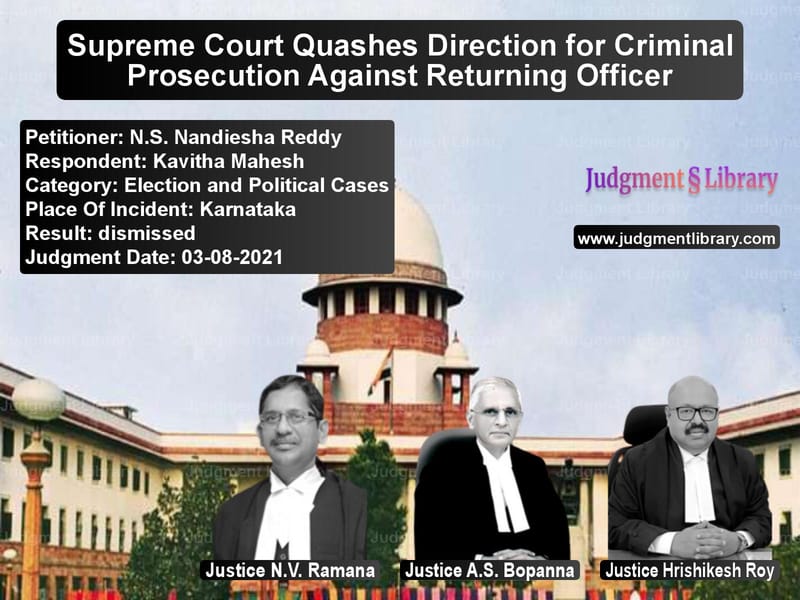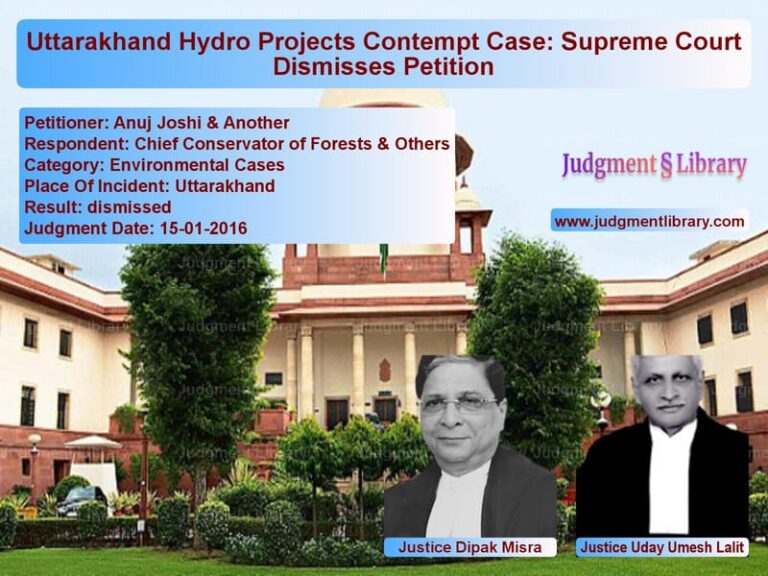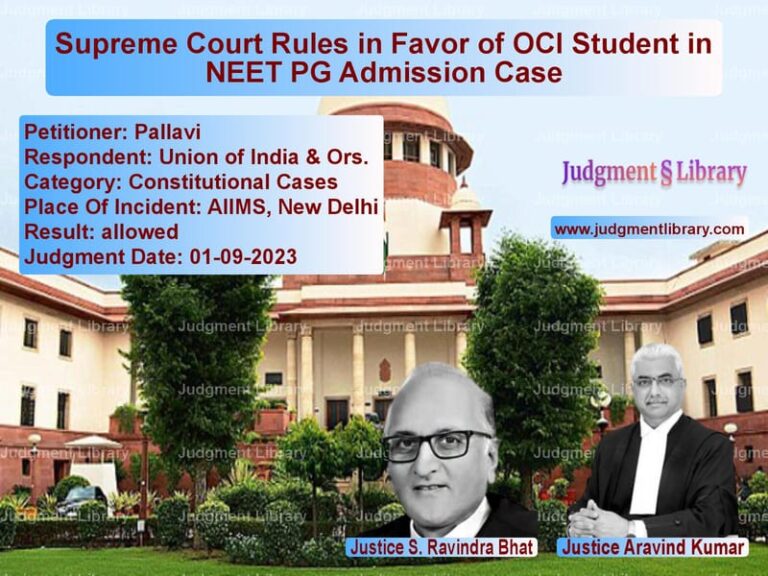Supreme Court Quashes Direction for Criminal Prosecution Against Returning Officer
The case of N.S. Nandiesha Reddy v. Kavitha Mahesh revolves around a dispute concerning the election of a Member of the Karnataka Legislative Assembly (MLA) for the 151 K.R. Pura Constituency. The Supreme Court was tasked with reviewing the High Court’s direction to initiate criminal prosecution against a Returning Officer for allegedly providing false evidence in a case related to the rejection of nomination papers during the election process.
Background of the Case
The dispute centers on the 2008 Karnataka Legislative Assembly elections, specifically regarding the nomination papers submitted by the election petitioner, Kavitha Mahesh. The appellant, N.S. Nandiesha Reddy, had been elected as the MLA from the K.R. Pura Constituency in Bangalore. The election petitioner, Kavitha Mahesh, alleged that her nomination papers were improperly rejected by the Returning Officer, Mr. Ashok Mensinkai, and filed an election petition seeking to declare the election invalid.
The High Court, after hearing the election petition, found that the Returning Officer had indeed rejected the nomination papers in an improper manner. In addition, the Court observed inconsistencies in the Returning Officer’s testimony during the election petition proceedings. Based on these findings, the High Court directed the Registrar General to lodge a complaint against the Returning Officer for committing perjury, leading to criminal prosecution under Section 193 of the Indian Penal Code (IPC).
Key Issues Raised
- Whether the High Court was justified in directing criminal prosecution against the Returning Officer based on his alleged inconsistent statements during the election petition proceedings.
- Whether the appellant, as the Returning Officer, had committed perjury or deliberately provided false evidence.
- Whether the election petitioner’s nomination papers were wrongfully rejected.
Petitioner’s Arguments
The appellants, Mr. N.S. Nandiesha Reddy and Mr. Ashok Mensinkai, raised the following arguments in their defense:
- The rejection of the nomination papers was done in accordance with the law, and the Returning Officer had no ulterior motive in rejecting the papers.
- The allegations of perjury were unfounded as the statements made by the Returning Officer during cross-examination were consistent with the facts.
- The High Court’s order directing criminal prosecution was based on an erroneous interpretation of the Returning Officer’s testimony.
- The rejection of nomination papers was procedural and in line with the election laws.
Respondent’s Defense
The election petitioner, Ms. Kavitha Mahesh, argued that:
- The Returning Officer had made false and inconsistent statements regarding the rejection of her nomination papers, which amounted to perjury.
- The rejection of her nomination papers was done in violation of the election laws, and she was unfairly deprived of the opportunity to contest the election.
- The direction for criminal prosecution was justified as the Returning Officer had knowingly provided false evidence under oath.
High Court’s Decision
The High Court of Karnataka ruled that:
- The Returning Officer had given inconsistent and unreliable evidence in court.
- His actions amounted to perjury as he contradicted himself under oath during the proceedings.
- It was in the interest of justice to direct criminal prosecution under Section 193 of the IPC for providing false evidence.
Supreme Court’s Ruling
The Supreme Court examined the case and came to the following conclusions:
- The allegations of perjury against the Returning Officer were not substantiated. The inconsistencies in the statements made by the Returning Officer were not deliberate falsehoods but could have been attributed to the passage of time and the nature of the events.
- The rejection of the nomination papers, while procedurally flawed, did not warrant criminal prosecution. The appellant’s actions could not be construed as intentional or malicious.
- While the election process must be conducted with the utmost transparency and fairness, the Court found that there was insufficient evidence to warrant criminal prosecution under Section 193 of the IPC.
Key Observations from the Judgment
The Court made the following key observations in its judgment:
“Merely because a witness has made contradictory statements at two different stages in a judicial proceeding does not by itself always justify a prosecution for perjury under Section 193 IPC; it must be shown that the deponent has intentionally given false statements in any stage of the judicial proceeding.”
The Court further noted:
“In the present case, the Returning Officer was acting within his discretion and following established procedures. The inconsistencies in his statements do not necessarily indicate intentional falsehood or perjury.”
Final Judgment
The Supreme Court allowed the appeal and ruled that:
- The allegations of perjury were not proven and did not justify criminal prosecution.
- The direction for criminal proceedings was set aside.
- The High Court’s order was overruled, and the case was remanded with directions to proceed with the election dispute in accordance with the law.
Impact of the Judgment
This ruling reinforces the legal principle that not every inconsistency in testimony amounts to criminal liability. The judgment clarifies that:
- Inconsistencies in a witness’s testimony do not automatically lead to accusations of perjury unless there is clear evidence of intentional falsehood.
- Criminal prosecution should not be initiated lightly, particularly when the allegations do not involve intentional falsehoods or significant violations of the law.
- The role of Returning Officers must be scrutinized carefully, but the legal principle of fairness and justice must guide the actions taken against them.
Conclusion
The Supreme Court’s decision in N.S. Nandiesha Reddy v. Kavitha Mahesh reaffirms the importance of fairness in judicial proceedings. It ensures that only intentional falsehoods are prosecuted under perjury laws, preventing unnecessary criminal actions based on inconsistencies that may occur due to time or memory lapses. The judgment underscores the importance of maintaining the integrity of the electoral process while safeguarding the rights of individuals who serve in public capacities like Returning Officers.
Read also: https://judgmentlibrary.com/supreme-court-upholds-electoral-bonds-scheme-amid-transparency-concerns/
Petitioner Name: N.S. Nandiesha Reddy.Respondent Name: Kavitha Mahesh.Judgment By: Justice N.V. Ramana, Justice A.S. Bopanna, Justice Hrishikesh Roy.Place Of Incident: Karnataka.Judgment Date: 03-08-2021.
Don’t miss out on the full details! Download the complete judgment in PDF format below and gain valuable insights instantly!
Download Judgment: n.s.-nandiesha-reddy-vs-kavitha-mahesh-supreme-court-of-india-judgment-dated-03-08-2021.pdf
Directly Download Judgment: Directly download this Judgment
See all petitions in Fundamental Rights
See all petitions in Constitution Interpretation
See all petitions in Judgment by N.V. Ramana
See all petitions in Judgment by A. S. Bopanna
See all petitions in Judgment by Hrishikesh Roy
See all petitions in dismissed
See all petitions in supreme court of India judgments August 2021
See all petitions in 2021 judgments
See all posts in Election and Political Cases Category
See all allowed petitions in Election and Political Cases Category
See all Dismissed petitions in Election and Political Cases Category
See all partially allowed petitions in Election and Political Cases Category







